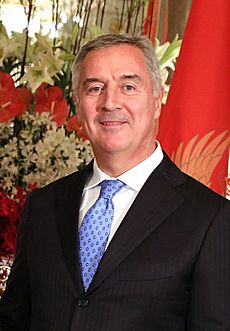Kleptocracy facts for kids
Kleptocracy is a type of government where the leaders unfairly use their power to take money and wealth from the people and the country they rule, mostly for themselves and their friends. Think of it like leaders acting like thieves on a very large scale, using their position to get rich instead of helping everyone.

The word "Kleptocracy" comes from two Greek words. "Kleptēs" means "thief," and "kratos" means "power" or "rule." So, put together, it means "rule by thieves." Sometimes, people also call it "thievocracy."
In a kleptocracy, the people in charge, called kleptocrats, don't use the country's money for things like building schools, hospitals, or roads. Instead, they secretly take this money or get rich through unfair deals and special favors. They often hide this money in secret accounts, sometimes even in other countries.
This is different from other types of rule, like when the richest people rule (plutocracy) or when a small group of powerful people rule (oligarchy). In a kleptocracy, the main goal of the corrupt leaders is simply to get rich by stealing from the country's resources and money.
The idea of kleptocracy has been around for a long time. One of the first times the word was used in English was back in 1819.
Contents
How it works
Kleptocratic leaders often see the country's money, which comes from things like taxes or selling resources, as their own personal piggy bank. They might spend huge amounts on fancy things for themselves or their families.
To keep their stolen money safe, especially if they lose power, these leaders often move it out of their country and hide it in secret accounts or investments in other places.
Sometimes, leaders might make rules or policies that make it easier for them and their friends to take money or property from the people. This can make people feel like they have to do what the leaders say, even if it's unfair.
In some cases, this kind of unfair taking of money isn't just done by the top leaders. It can also involve wealthy individuals or businesses who get special treatment, unfair deals, or advantages from the government because they are friends with the people in power. This is sometimes called "crony capitalism," where success in business depends more on having friends in high places than on being good at business.
Why is it harmful?
Kleptocracy is very bad for a country and its people. Here are some of the harmful effects
- Hurts the Economy
When leaders steal money, it means there's less money for important things that help the country grow, like building factories, supporting businesses, or investing in new ideas. It can also make people from other countries not want to invest their money there because they worry it's not safe or fair.
- Lowers Quality of Life
The money that is stolen is money that could have been used for public services. This means there might be less money for hospitals, so people don't get good healthcare. There might be less money for schools, so children don't get a good education. There might be fewer roads or parks. This makes life harder for everyone except the kleptocrats.
- Weakens Fairness and Trust
When leaders are corrupt and steal, it makes people lose trust in the government and the idea of fairness. It can make it harder for a country to be run in a way that represents what the people want.
Examples
Throughout history, there have been leaders accused of being kleptocrats, taking vast amounts of money from their countries. Here are a few examples, based on estimates from a report in the early 2000s (remembering that these are estimates and the exact amounts are often hard to know):
- Suharto (Indonesia): Estimated to have taken between $15 billion and $35 billion.
- Ferdinand Marcos (Philippines): Estimated to have taken between $5 billion and $10 billion.
- Mobutu Sese Seko (Zaire, now Democratic Republic of Congo): Estimated to have taken about $5 billion.
- Sani Abacha (Nigeria): Estimated to have taken between $2 billion and $5 billion.
- Slobodan Milošević (Yugoslavia): Estimated to have taken about $1 billion.
- Jean-Claude Duvalier (Haiti): Estimated to have taken between $300 million and $800 million.
- Alberto Fujimori (Peru): Estimated to have taken about $600 million.
- Arnoldo Alemán (Nicaragua): Estimated to have taken about $100 million.
- Joseph Estrada (Philippines): Estimated to have taken between $78 million and $80 million.
Kleptocracy is a serious problem because it harms countries and prevents people from having a better life by taking away resources that should be used for everyone's benefit.
See also
 In Spanish: Cleptocracia para niños
In Spanish: Cleptocracia para niños
 | Shirley Ann Jackson |
 | Garett Morgan |
 | J. Ernest Wilkins Jr. |
 | Elijah McCoy |

